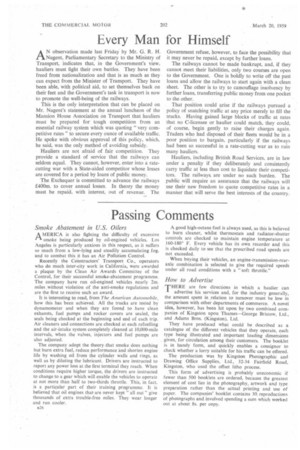• Every Man for Himself A N observation made last Friday
Page 32

If you've noticed an error in this article please click here to report it so we can fix it.
by Mr. G. R. H. Nugent, Parliamentary Secretary to the Ministry of Transport, indicates that, in the Government's view, hauliers must fight their own battles. They have been freed from nationalization and that is as much as they can expect from the Minister of Transport. They have been able, with political aid, to set themselves back on their feet and the Government's task in transport is now to promote the well-being of the railways.
This is the only interpretation that can be placed on Mr. Nugent's statement at the annual luncheon of the Mansion House Association on Transport that hauliers must be prepared for tough competition from an essential railway system which was quoting "very competitive rates" to secure every ounce of available traffic. He spoke with obvious approval of this policy, which, he said, was the only method of avoiding subsidy.
Hauliers are not afraid of fair competition. They provide a standard of service that the railways can seldom equal. They cannot, however, enter into a ratecutting war with a State-aided competitor whose losses are covered for a period by loans of public money.
The Exchequer is committed to advance the railways &Wm. to cover annual losses. In theory the money must be repaid, with interest, out of revenue. The Government refuse, however, to face the possibility that it may never be repaid, except by further loans.
The railways cannot be made bankrupt, and, if they cannot meet their liabilities, only two courses are open to the Government. One is boldly to write off the past loans and allow the railways to start again with a clean sheet. The other is to try to camouflage insolvency by further loans, transferring public money from one pocket to the other.
That position could arise if the railways pursued a policy of snatching traffic at any price merely to fill the trucks. Having gained large blocks of traffic at rates that no C-licensee or haulier could match, they could, of course, begin gently to raise their charges again. Traders who had disposed of their fleets would be in a poor position to bargain, particularly if the railways had been so successful in a rate-cutting war as to ruin many hauliers.
Hauliers, including British Road Services, are in law under a penalty if they deliberately and consistently carry traffic at less than cost to liquidate their competitors. The railways, are under no such burden. The public will require an assurance that the railways will use their new freedom to quote competitive rates in a manner that will serve the best interests of the country.












































































































